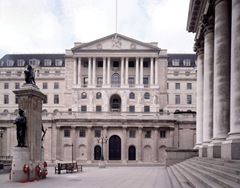Banks set for ‘radical’ change
 The Westminster Treasury Committee says an overhaul is needed to prevent the necessity for government intervention in a future financial crisis.
The Westminster Treasury Committee says an overhaul is needed to prevent the necessity for government intervention in a future financial crisis.
Throughout the crisis, it was considered that the big banks were too important to fail. The Treasury Committee’s report into the banking crisis accepts that depositors did have to be saved, but worries that a culture of bail-out has been created.
Banking for most people constitutes a basic necessity, which they expect to have little problems with. Consumers need more education about risk and the extent to which protection is on offer. The majority of depositors, the Treasury Committee suggests, are in no position to undertake due diligence on their banks, therefore it is unreasonable to ask them to do so.
Successful reform, it is argued, would only come about if risk is transferred away from government, and back to the banking sector. “Radical reform”, it says, is needed but it will not come easily.
It looked at three ways the system could be reformed.
The first, evolutionary reform, centres on more extensive use of existing regulator tools. The committee, however, was dubious about how effective that sort of
reform could be in changing the current system.
While banks should of course improve the monitoring of their risk, human judgement, the committee says, will always play a role. Error therefore is always a possibility.
Pessimistically it also states that “over time, it is certain that such failures will occur [again]”, adding that the priority for reform should not be to avoid another crisis, but rather that the system is “resilient” if a failure occurs.
Although the UK Government had ruled out wide-reaching structural reform changes such as ‘narrow banking’, John McFall’s committee stated that the Government’s conclusions may not be acknowledged around the world given that the US’ proposals do include such reform. The report recommends that the debate on the reform of the banks should remain as wide as possible, ruling only very few things out.
Narrow banking would essentially limit the number of banks who can legitimately call themselves ‘banks’ in the traditional sense, i.e. carrying out the conventional banking functions such as payment systems and deposit-taking.
Although it could be said that even those banks failed during the crisis, the committee believes that happened because they were allowed to interact freely with the wholesale markets.
The report does recognise that if these reforms worked as intended, consumers would be protected and the role of government would be reduced. The problem there, in the committee’s view, is that the market now expects governments to support the banking system; in short the market should not be able to expect government assistance should they fail again.
Propriety trading, i.e. trading on behalf of a firm rather than on behalf of a client also proved problematic in the run up to the financial crisis. The committee did highlight it as a problem that would need closer control, but it also identified difficulties in doing that. Trading in that manner, it says, is hard to define and indeed the committee called it a “grey area”.
Overall though, structural reform is described as one way to significantly alter the system.
Government intervention is seen by the committee as necessary as it would have been difficult to find a way for an institution to “fail smoothly”. Obliging banks to draw up the living wills, or ‘wind- down plans’, in case they fail could increase the cost of credit but the committee is satisfied that it would result in risk being priced more accurately. Living will resolutions would make it easier for the Government to inflict losses on the bank’s creditors as it would fail in “an orderly way”. The Financial Services Authority has already recommended this change.
As banking is a global operation the committee recognises the need for global co-operation but it also states that any delay in achieving that should not be used as an excuse not to reform the system. Indeed should that co-operation not materialise, the UK’s large banking system, in the committee’s view, should happen anyway as it is in “our own self- interest”.





